Local actors Steven Coe and Kendall Millang getting better and better
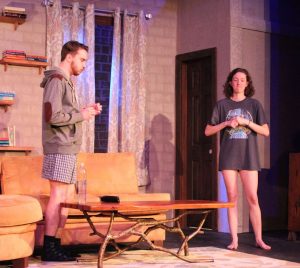 Lab Theater’s production of Neil LaBute’s The Way We Get By closed with a matinee on Sunday, February 19. It starred relative newcomers Steven Coe and Kendall Millang who were, in a word, terrific. But the duo developed such incredible on-stage chemistry over the course of rehearsal and early performances that the show’s end came almost too suddenly.
Lab Theater’s production of Neil LaBute’s The Way We Get By closed with a matinee on Sunday, February 19. It starred relative newcomers Steven Coe and Kendall Millang who were, in a word, terrific. But the duo developed such incredible on-stage chemistry over the course of rehearsal and early performances that the show’s end came almost too suddenly.
“The end of a show [like this] is bittersweet,” Kendall acknowledges. “You work so hard and it’s finally coming 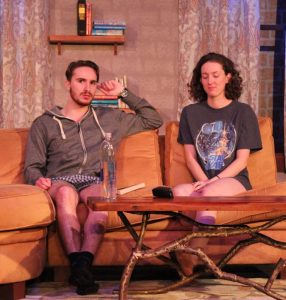 together so nicely, and then it’s over.”
together so nicely, and then it’s over.”
“I could probably go another week,” Steven jovially adds. Then, cocking his head to one side, he modifies, “which tells me that it is ending at just the right time.”
Accustomed to the push and pull, give and take implicit in Neil LaBute’s nimble script, Millang and Coe complement each other like seasoned talk show hosts. They rarely speak over one another, and seem to understand each other implicitly, often building on each other’s thoughts and comments.
“She 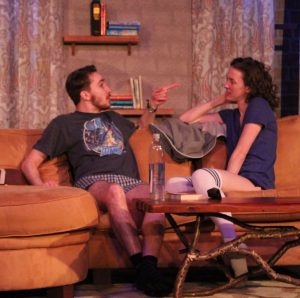 even laughs at my jokes, which are really, really bad,” Steven points out.
even laughs at my jokes, which are really, really bad,” Steven points out.
“They really are,” Kendall emphasizes with a knowing smile.
But what stands out more than anything as these two talk about the show and the subject of acting is the professional approach they take toward their craft, and that’s remarkable considering that Kendall is but 21; Steven a mere 28.
Their former theater professor at Florida SouthWestern 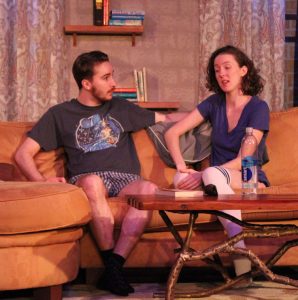 State College (FSW), Stuart Brown, could not be more impressed or pleased with the progress they’ve made since taking his acting classes. The Way We Get By was a stretch for both of his young protégés. Although she won the lead in both of the plays she appeared in at FSW, “Kendall was less ready to trust, less excited about being vulnerable, but when she goes there, she’s amazing and interesting,” Brown points out. “Steven is really bright, really verbal, really good at language-based, idea plays,” Brown adds. But he was less comfortable with evocative,
State College (FSW), Stuart Brown, could not be more impressed or pleased with the progress they’ve made since taking his acting classes. The Way We Get By was a stretch for both of his young protégés. Although she won the lead in both of the plays she appeared in at FSW, “Kendall was less ready to trust, less excited about being vulnerable, but when she goes there, she’s amazing and interesting,” Brown points out. “Steven is really bright, really verbal, really good at language-based, idea plays,” Brown adds. But he was less comfortable with evocative, 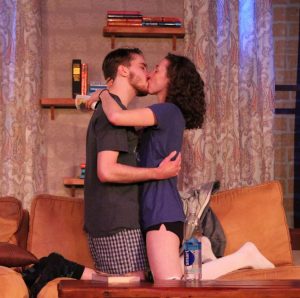 physical scripts that compelled him to get in touch with his body and emotions.
physical scripts that compelled him to get in touch with his body and emotions.
And that’s precisely where The Way We Get By took both of these young actors. To portray their characters properly, Millang had to make herself vulnerable and learn to trust Coe implicitly. For his part, Steven had to get out of his head and connect with the emotions being experienced and expressed not only by his own character, but Kendall’s character as well.
“Every 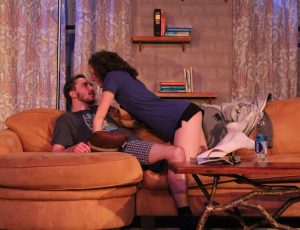 night was a learning process,” Coe readily concedes.
night was a learning process,” Coe readily concedes.
“Being angry, then loving each other, then going back to being angry again was an emotional rollercoaster,” Kendall supplements.
“This [was] a show that’s all about the push and pull, listening and talking, and giving to one another,” Steven agrees. “You can’t phone it in. You 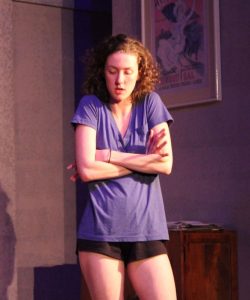 have to pay attention.” Or else you find you’re merely reciting lines of dialogue rather than conveying the proper emotion in just the right way.
have to pay attention.” Or else you find you’re merely reciting lines of dialogue rather than conveying the proper emotion in just the right way.
In The Way We Get By, Millang and Coe play step-siblings who’ve resisted, if not denied, the physical and emotional attraction that they felt for each other from the time they were teens. One of the more complex emotions they had to learn, develop and master was the ability to be so mad at someone you want to throttle them while simultaneously loving them so much you’d willingly sacrifice your life for them. Kendall is the eldest of three siblings, and could draw on real-life 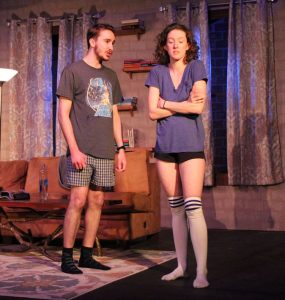 experiences from her not-too-distant childhood. But Steven has only a half-brother thirteen years his senior who was out of the house and gone by the time Steven was seven years old.
experiences from her not-too-distant childhood. But Steven has only a half-brother thirteen years his senior who was out of the house and gone by the time Steven was seven years old.
It hardly mattered.
“That’s where Method comes into play,” explains Coe matter-of-factly, referring to the system of acting taught by famed Russian actor, director and teacher Constantin Stanislavsky.
One of the basic tenets of Stanislavsky’s system was to portray natural, 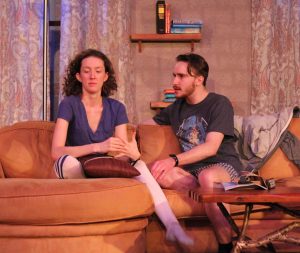 believable people on stage and his books My Life in Art (an autobiography), An Actor Prepares, Building a Character, and Creating a Role are still studied today.
believable people on stage and his books My Life in Art (an autobiography), An Actor Prepares, Building a Character, and Creating a Role are still studied today.
In Coe’s estimation, it all boils down to empathizing.
“So much of being an actor is about empathy,” he says. “So even though I didn’t really have siblings, it’s still a human thing. If you’ve been around anyone for more than, 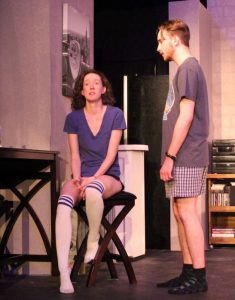 say, a year, you know the feeling of being mad as hell at someone, and wanting to strangle them at times, but loving them at the same time.”
say, a year, you know the feeling of being mad as hell at someone, and wanting to strangle them at times, but loving them at the same time.”
But knowing that intellectually and being able to depict those conflicting emotions on stage are completely different animals. He credits Stuart Brown for giving him a basic tool kit of acting skills and techniques, but it was while he worked at Universal Studio’s Halloween Horror Nights in Orlando “ducking drunks’ punches and scaring the hell out of people” that he developed the ability to get out of his head and the self-confidence to take his talent to the next level.
“It’s 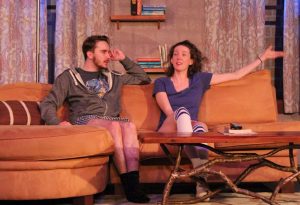 a very different sort of acting,” he remarks, stating the obvious. “It’s very physical.” You also have to be quick on your feet and able to roll with the punches (if you’ll permit the pun).
a very different sort of acting,” he remarks, stating the obvious. “It’s very physical.” You also have to be quick on your feet and able to roll with the punches (if you’ll permit the pun).
The experience also left Coe with a desire to play creepy, heinous characters such as The Boy in Veronica’s Room.
“For me, 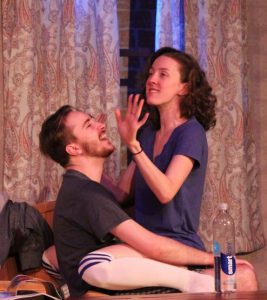 relying on another actor so heavily was the biggest stretch,” answers Kendall when asked what she’s taking away from the play. “In the plays I was in previously, there was this whole ensemble. It’s weird being on stage a whole hour and a half, but with ensembles, you’re only in certain scenes or there’s a bunch of different people talking. But here, there’s only one other actor who has lines, and it’s all back-and-forth. So if one of us fucks up, the other has to reel it right back in. It’s lines definitely, but it’s also the right emotional response. There are times when you’re acting with someone
relying on another actor so heavily was the biggest stretch,” answers Kendall when asked what she’s taking away from the play. “In the plays I was in previously, there was this whole ensemble. It’s weird being on stage a whole hour and a half, but with ensembles, you’re only in certain scenes or there’s a bunch of different people talking. But here, there’s only one other actor who has lines, and it’s all back-and-forth. So if one of us fucks up, the other has to reel it right back in. It’s lines definitely, but it’s also the right emotional response. There are times when you’re acting with someone 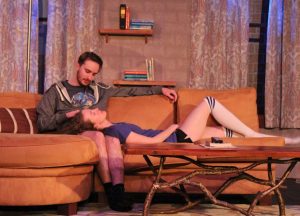 who’s not as emotionally invested, so it’s kind of like acting with a brick wall. Here, you’re relying on someone to go into the scene with you – to actually react and be part of the scene.”
who’s not as emotionally invested, so it’s kind of like acting with a brick wall. Here, you’re relying on someone to go into the scene with you – to actually react and be part of the scene.”
Pacing and stamina are also commodities in high demand for anyone who aspires to play the lead in small-cast stage shows. Talent aside, not every actor possesses the ability to concentrate like a world-class chess master for 90 or 120 minutes at a clip.
“This one 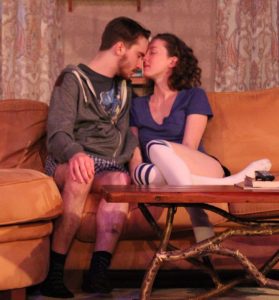 was particularly exhausting,” Coe nods. “It was an hour and a half sprint every night” that required intense concentration and focus. Neither he nor Kendall could mentally or emotionally check out for a few lines. There were no other actors to spell them or allow them to catch their breath.
was particularly exhausting,” Coe nods. “It was an hour and a half sprint every night” that required intense concentration and focus. Neither he nor Kendall could mentally or emotionally check out for a few lines. There were no other actors to spell them or allow them to catch their breath.
“And one of the things that’s been a learning process is the role of the audience,” Steven points out. “No two audiences laughed at the same thing. Each found something different that was funny. If you expect a laugh too much, it can interrupt the scene.”
“But 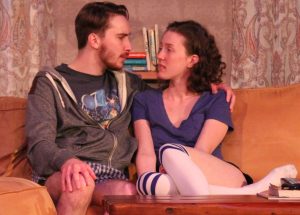 it’s hard not to wonder what’s going on when an audience doesn’t laugh at something every other one has laughed at,” Kendall admits.
it’s hard not to wonder what’s going on when an audience doesn’t laugh at something every other one has laughed at,” Kendall admits.
But not only did Coe and Millang make it through the play’s 11 performance run, they performed to standing ovations. This validation not only buoys their desire to tackle even bigger and more demanding roles, it infuses them with the confidence that they have the talent to measure up.
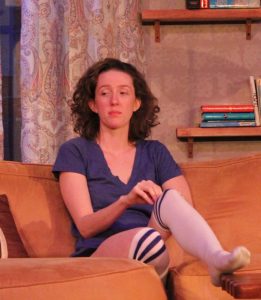 “When [Prof. Brown] cast me in the lead in my very first play, I said to myself, ‘I shouldn’t be here, but okay.’ I felt less so when I got the lead in the next play too. Now, it’s like yeah, if I can do this, I can handle any other script that comes along.”
“When [Prof. Brown] cast me in the lead in my very first play, I said to myself, ‘I shouldn’t be here, but okay.’ I felt less so when I got the lead in the next play too. Now, it’s like yeah, if I can do this, I can handle any other script that comes along.”
Coe couldn’t agree more. He has a reputation for placing himself in challenging roles and situations that build confidence. For example, while he was playing The Boy in Veronica’s Room for Lab Theater, he was also on the Murder Mystery Dinner Train over at the Seminole Gulf Railway.
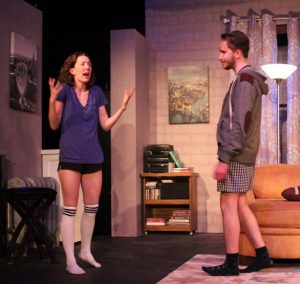 “Professionally, it’s not only what I love to do, I seek out stuff that challenges me, that expands my limits. If I can do this, I can do anything. If I can dodge the drunks’ punches and scare people, I can do anything. If I can to on that train and talk over people while they’re eating and project over the sound of a running train, I can do anything. If I can come here for an hour and a half and do something that actually resembles real acting, I can do anything.”
“Professionally, it’s not only what I love to do, I seek out stuff that challenges me, that expands my limits. If I can do this, I can do anything. If I can dodge the drunks’ punches and scare people, I can do anything. If I can to on that train and talk over people while they’re eating and project over the sound of a running train, I can do anything. If I can come here for an hour and a half and do something that actually resembles real acting, I can do anything.”
“He’s 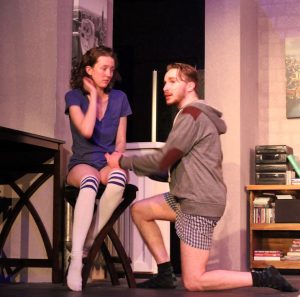 willing to go anywhere you want to take him,” observes Prof. Brown. “He catches on really quickly, works hard, is always thinking, especially throughout the rehearsal process, and grows quickly. But most of all, he’s hungry.”
willing to go anywhere you want to take him,” observes Prof. Brown. “He catches on really quickly, works hard, is always thinking, especially throughout the rehearsal process, and grows quickly. But most of all, he’s hungry.”
However, Steven didn’t start out wanting to be an actor. “I didn’t take my first acting class until I was already in middle school, and then, only because my friends were in it and I wanted to be with them,” Coe laughs. He’s responded ever since to the ample encouragement he’s received, and his training extends far 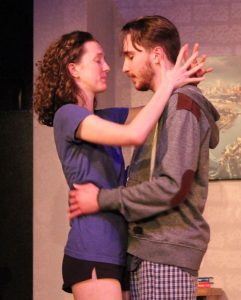 beyond the roles he takes on and the productions he’s been in.
beyond the roles he takes on and the productions he’s been in.
“I watch a lot of film and like different actors for different things,” Steven shares. “Currently, I really like Ryan Gosling. He chooses roles I really like, such as Blade Runner. And I love his style. He’s a very natural guy. But Heath Ledger was the actor who I found most inspirational. He’s one of the reasons I got into acting. At the time I began to seriously pursue acting, the Dark Knight had just come out. And to see Ledger go from Broke Back Mountain to that, it was so amazing that he could flip roles and personalities like that.”
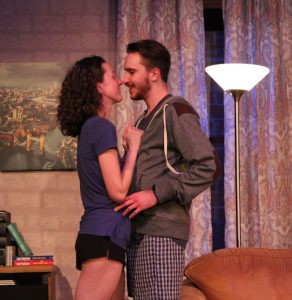 Kendall’s segue into acting was also accidental. She had, and still has, aspirations to be a writer – short stories, playwriting and hopefully screenplays. She may even participate next year in The Lab’s 24-hour playwriting project.
Kendall’s segue into acting was also accidental. She had, and still has, aspirations to be a writer – short stories, playwriting and hopefully screenplays. She may even participate next year in The Lab’s 24-hour playwriting project.
“I actually decided to take an acting class to better inform my writing,” Kendall remarks. “Then it got really weird because I discovered that I really liked [acting]. Acting is such a weird thing, and so I took another acting class, and then another. And then Stuart Brown told me I should be a theater major, and it struck me as a good idea.”
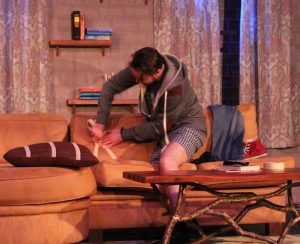 Where Brown found Coe to be more analytical, he sees Millang as extremely intuitive.
Where Brown found Coe to be more analytical, he sees Millang as extremely intuitive.
“She has tremendous potential and the more she digs into [challenging roles], the further she will go,” Brown assesses. And that extends beyond the comedic Tina Fey-type parts she prefers.
“I like humor. I get it.” She’s even worked in a comedy club for a time. “It’s a lot easier to deal with than dramas 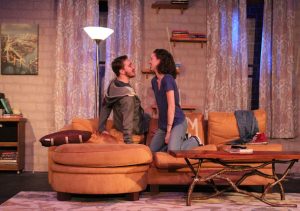 or thrillers. But of course I also like to step out of my comfort zone and do roles like that. Every door that opens opens another door. I’m going to see where they take me.”
or thrillers. But of course I also like to step out of my comfort zone and do roles like that. Every door that opens opens another door. I’m going to see where they take me.”
For now, Kendall is planning to further her education. She is considering FGCU, but thinks Jacksonville is “pretty dope” too. She find the latter attractive because of their film and history programs.
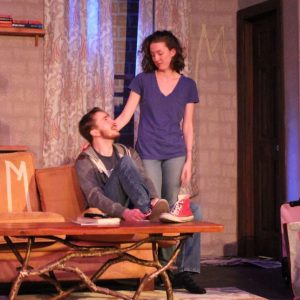 “While I love theater, I really love film and would like to do film acting because there’s an intimacy you can achieve in film that you can’t do on stage because your reactions have to be bigger, more exaggerated, more theatrical to come across to a live audience,” Kendall reveals. “I like films that aren’t fantastical or action-adventures. I like films about people, that are true life, that make the mundane interesting.”
“While I love theater, I really love film and would like to do film acting because there’s an intimacy you can achieve in film that you can’t do on stage because your reactions have to be bigger, more exaggerated, more theatrical to come across to a live audience,” Kendall reveals. “I like films that aren’t fantastical or action-adventures. I like films about people, that are true life, that make the mundane interesting.”
And it’s that type of authenticity that attracted both her and Coe to The Way We Get By. “When you read [the script] 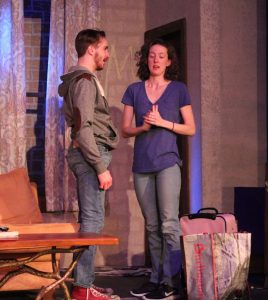 the first time through, the honesty of these two characters really jumps off the page,” Kendall asserts. “It wasn’t easy being in the play, but it was easy to connect to it because it is so relatable. I think the honesty in this play resonates with everybody.”
the first time through, the honesty of these two characters really jumps off the page,” Kendall asserts. “It wasn’t easy being in the play, but it was easy to connect to it because it is so relatable. I think the honesty in this play resonates with everybody.”
Because of their innate intelligence, talent and penchant for professional and personal self-discovery and achievement, the future for these two actors is bright, and we can only hope that they continue to find opportunities right here in Southwest Florida to hone and share their talents with theater communities. In this regard, the Laboratory Theater of Florida 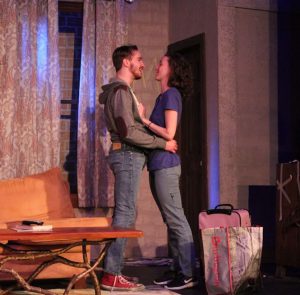 and Artistic Director Annette Trossbach are likely to figure prominently in their plans.
and Artistic Director Annette Trossbach are likely to figure prominently in their plans.
“They do great work here,” Coe emphatically declares. “We don’t have to take parts just to be in theater. They do really good work here that you can be proud to be part of. And there are good opportunities elsewhere in Southwest Florida. God, there’s Florida Rep.”
But don’t be surprised either or both eventually make the leap to Atlanta, New York or L.A. All 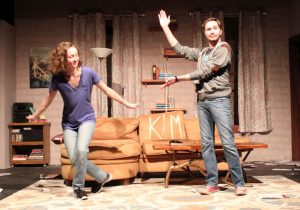 that’s holding them back at the moment is the money to make the move and the need for a little more time on the boards at local theatrical companies.
that’s holding them back at the moment is the money to make the move and the need for a little more time on the boards at local theatrical companies.
Meanwhile, we get to witness and applaud their continuing growth.
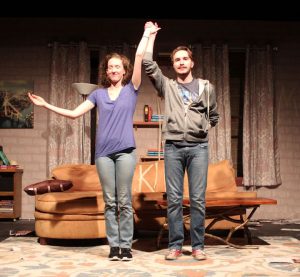 February 22, 2018.
February 22, 2018.
RELATED POSTS
- Lab’s ‘The Way We Get By’ all about the journey
- Lab’s ‘Way We Get By’ sexy love story
- Spotlight on ‘Way We Get By’ playwright Neil LaBute
- Spotlight on ‘Way We Get By’ actor Steven Coe
- Kendall Millang plays role of Beth in Lab’s ‘The Way We Get By’
- Annette Trossbach directs ‘The Way We Get By’
- Annette Trossbach dishes on privilege of directing ‘Way We Get By’
- ‘Way We Get By’ play dates, times and ticket info














 Tom Hall is both an amateur artist and aspiring novelist who writes art quest thrillers. He is in the final stages of completing his debut novel titled "Art Detective," a story that fictionalizes the discovery of the fabled billion-dollar Impressionist collection of Parisian art dealer Josse Bernheim-Jeune, thought by many to have perished during World War II when the collection's hiding place, Castle de Rastignac in southern France, was destroyed by the Wehrmacht in reprisal for attacks made by members of the Resistance operating in the area. A former tax attorney, Tom holds a bachelor's degree as well as both a juris doctorate and masters of laws in taxation from the University of Florida. Tom lives in Estero, Florida with his fiancee, Connie, and their four cats.
Tom Hall is both an amateur artist and aspiring novelist who writes art quest thrillers. He is in the final stages of completing his debut novel titled "Art Detective," a story that fictionalizes the discovery of the fabled billion-dollar Impressionist collection of Parisian art dealer Josse Bernheim-Jeune, thought by many to have perished during World War II when the collection's hiding place, Castle de Rastignac in southern France, was destroyed by the Wehrmacht in reprisal for attacks made by members of the Resistance operating in the area. A former tax attorney, Tom holds a bachelor's degree as well as both a juris doctorate and masters of laws in taxation from the University of Florida. Tom lives in Estero, Florida with his fiancee, Connie, and their four cats.